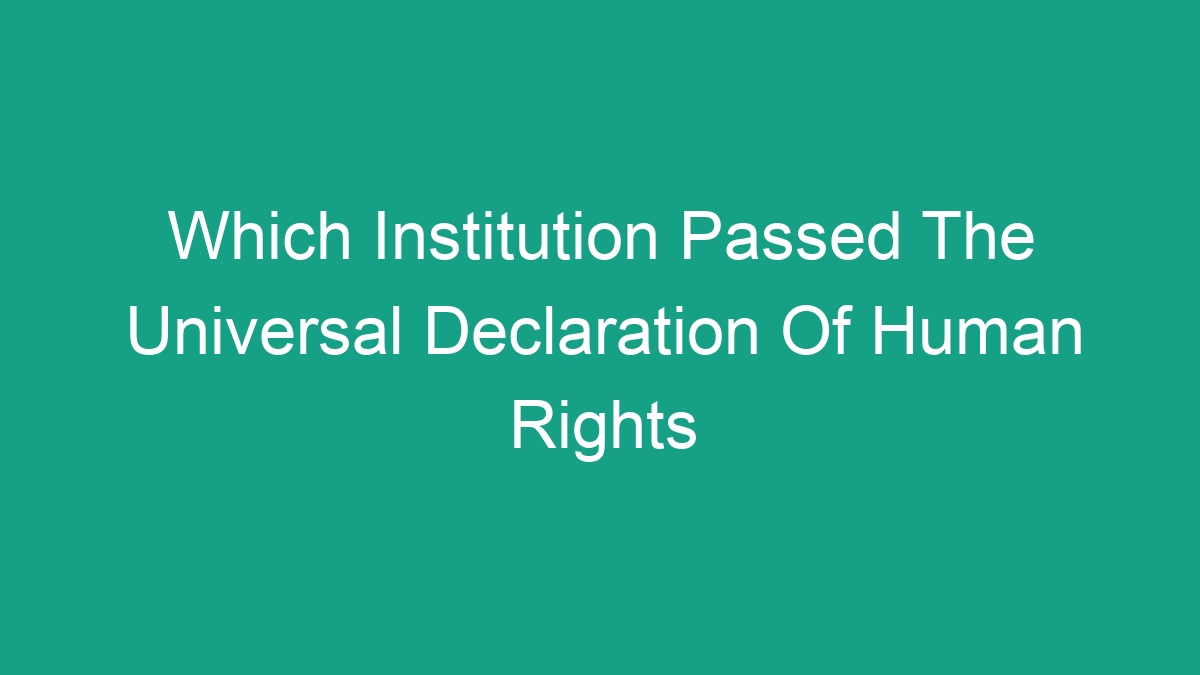
Introduction
The Universal Declaration of Human Rights (UDHR) is a milestone document in the history of human rights. It was proclaimed by the United Nations General Assembly on December 10, 1948, as a common standard of achievements for all peoples and all nations. But which institution passed this monumental declaration? In this comprehensive article, we will delve into the history of the UDHR, the institution that passed it, and its significance in the realm of human rights.
History of the Universal Declaration of Human Rights
The UDHR was drafted by representatives with different legal and cultural backgrounds from all regions of the world. It was created with the goal of setting out fundamental human rights to be universally protected. The drafting of the declaration was chaired by Eleanor Roosevelt, the widow of President Franklin D. Roosevelt, and a prominent human rights activist.
The process of drafting the UDHR began in 1946, just after the end of World War II. The atrocities committed during the war, including the Holocaust, served as a catalyst for the international community to take a stand on protecting the rights of individuals. The United Nations Human Rights Commission was created in 1946 to draft the declaration. The commission, comprising representatives from various countries, worked tirelessly to create a document that reflected the values and principles of human rights.
The Institution That Passed The Universal Declaration of Human Rights
The United Nations General Assembly is the institution that passed the Universal Declaration of Human Rights. The General Assembly, as the main deliberative, policymaking, and representative organ of the United Nations, is made up of all 193 Member States of the UN. Each Member State has one vote. Decisions on important questions, such as the adoption of the UDHR, require a two-thirds majority. This ensures that the declaration was truly a collaborative effort, endorsed by a significant majority of countries around the world.
On December 10, 1948, the United Nations General Assembly adopted and proclaimed the UDHR. The declaration was adopted as Resolution 217 at the Palais de Chaillot in Paris. This momentous event marked the first time that countries around the world had agreed on a comprehensive statement of inalienable human rights.
Significance of the Universal Declaration of Human Rights
The UDHR holds immense significance in the realm of human rights. It was the first international agreement that spelled out basic human rights that should be protected and respected by all nations. The declaration contains 30 articles that detail the rights and freedoms to which all individuals are entitled, regardless of race, color, religion, sex, language, political or other opinion, national or social origin, property, birth, or other status. Some of the key principles enshrined in the UDHR include the right to life, liberty, and security of person; the right to education; the right to work and to just and favorable conditions of work; and the right to freedom of thought, conscience, and religion, among others.
The significance of the UDHR also lies in its influence on subsequent human rights instruments and treaties. Many national constitutions and laws have incorporated the principles of the declaration. Additionally, the UDHR served as the foundation for the development of two international legally binding treaties: the International Covenant on Civil and Political Rights and the International Covenant on Economic, Social and Cultural Rights, both of which were adopted in 1966.
The universal principles enshrined in the UDHR have been influential in shaping the human rights landscape worldwide. The declaration has been translated into over 500 languages, making it the most translated document in the world. By setting out fundamental human rights to be universally protected, the UDHR has played a pivotal role in promoting and protecting human rights across the globe.
Challenges and Criticisms of the Universal Declaration of Human Rights
While the UDHR has had a profound impact on the promotion and protection of human rights, it has not been without its challenges and criticisms. One of the criticisms leveled against the declaration is that it is not legally binding. Although the UDHR has inspired the development of legally binding human rights treaties, it is not a treaty itself and does not have the force of international law. As a result, some argue that the declaration lacks the teeth needed for enforcement.
Another criticism is that the principles outlined in the UDHR are not universally respected. Many individuals and communities continue to face human rights abuses and violations. The principles enshrined in the declaration are often ignored or violated by governments and non-state actors, leading to ongoing human rights crises around the world.
Additionally, there have been criticisms of cultural relativism, with some arguing that the UDHR’s principles may not be universally applicable to all cultures and societies. This has led to debates about the universality of human rights and the need for a more culturally sensitive approach to addressing human rights issues.
Despite these challenges and criticisms, the UDHR remains a foundational document in the realm of human rights and continues to serve as a guiding framework for the promotion and protection of human rights worldwide.
Conclusion
The Universal Declaration of Human Rights, passed by the United Nations General Assembly, stands as a benchmark in the history of human rights. Its principles have inspired the development of numerous human rights instruments and influenced the framing of national laws and constitutions. While the UDHR may not be without its challenges and criticisms, its enduring significance and impact on the international human rights landscape cannot be denied. As we continue to navigate the complexities of the modern world, the principles enshrined in the declaration serve as a constant reminder of the inherent dignity and equality of all human beings.



